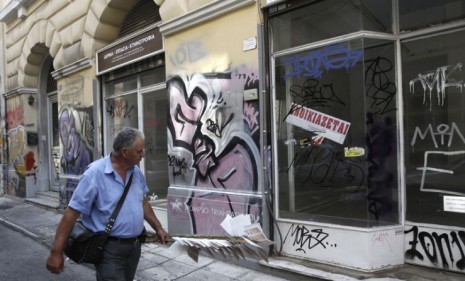Is a Greek default inevitable?
Nervous investors are bracing for the day when Greece will be unable to make payments on its massive debt

A free daily email with the biggest news stories of the day – and the best features from TheWeek.com
You are now subscribed
Your newsletter sign-up was successful
Greece is frantically trying to come up with money to make its debt payments, with help from other European nations. But more and more economists now believe that even with further austerity measures and bailouts, default might be inevitable. Is it really too late to pull Greece back from the precipice?
Yes. The challenge is saving the rest of Europe: "Greece will default, either now or in several months," says John Hussman at Hussman Funds. European leaders should be focusing on what they can do "to prevent contagion." It will be painful when Greece goes under, but it would be far worse if Italy or Spain defaulted. Both have high debt-to-GDP ratios, but for now there's no "credible risk" they'll default. The European Central Bank should continue buying their bonds to keep it that way.
"Preparing for a Greek default"
The Week
Escape your echo chamber. Get the facts behind the news, plus analysis from multiple perspectives.

Sign up for The Week's Free Newsletters
From our morning news briefing to a weekly Good News Newsletter, get the best of The Week delivered directly to your inbox.
From our morning news briefing to a weekly Good News Newsletter, get the best of The Week delivered directly to your inbox.
Hold on. Greece can still save itself: The Greek government can still secure a crucial $11 billion rescue payment, says Bob Traa, the International Monetary Fund representative in Greece, as quoted by Reuters. But Greece has to drastically shrink its government payrolls and improve tax collection first. "The ball is in the Greek court. Implementation is of the essence."
"Greece default hangs in balance"
Remember, saving Greece could doom Europe: The "best hope for Greece" is Germany, says Mallory Simon at CNN, whose lawmakers will vote Sept. 29 on the second Greek bailout and an overhaul of Europe's stability fund. But "even if Greece is spared," Europe's debt crisis won't be over. It might take so much money to bail out Greece that there "won't be enough left over to help other countries in need of aid," so saving Greece might mean simply letting some other nation go into default.
"A Greek tragedy: How the debt crisis spread like a virus in Contagion"
A free daily email with the biggest news stories of the day – and the best features from TheWeek.com
-
 Local elections 2026: where are they and who is expected to win?
Local elections 2026: where are they and who is expected to win?The Explainer Labour is braced for heavy losses and U-turn on postponing some council elections hasn’t helped the party’s prospects
-
 6 of the world’s most accessible destinations
6 of the world’s most accessible destinationsThe Week Recommends Experience all of Berlin, Singapore and Sydney
-
 How the FCC’s ‘equal time’ rule works
How the FCC’s ‘equal time’ rule worksIn the Spotlight The law is at the heart of the Colbert-CBS conflict